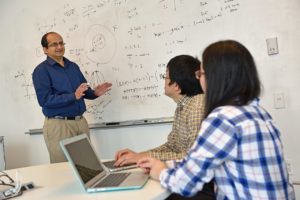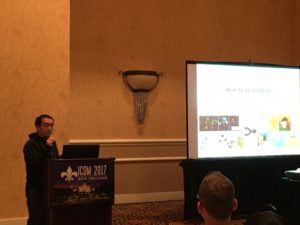DAC Student Spotlight: Ming Zhu

Ming Zhu, DAC Ph.D. student in computer science
Ming Zhu learned about machine reading comprehension — making computers understand sophisticated natural language and be able to answer questions about what was read — while taking a graduate course at Carnegie Mellon University.
“After building a state-of-the-art Neural Question Answering (QA) model from scratch based on a research paper, my confidence grew in believing I could be a part of this future technology and pushed me further to focus my Ph.D. research in this area,” said Zhu.
Her interest in QA led Zhu, who holds a bachelor of engineering degree from the University of Science and Technology of China, to Chandan Reddy who is now her advisor at the Discovery Analytics Center’s National Capital Region location.
“Currently I am working on QA models with clinical notes as context. Clinical notes are a huge treasure of information if you make good use of them. They can help doctors make better medical decisions for their patients and help patients better understand their healthcare conditions,” Zhu said.
For example, she said, when deciding how to treat a new patient, a doctor might ask “How does rheumatic fever affect the heart when the patient is pregnant?” But, reviewing all the clinical notes in the database is impossible and a search engine cannot deal with this kind of query very well.
The AI-based Question Answering system that Zhu is working on can help by reading and comprehending the whole corpus, retrieving the most relevant articles or notes when given a human question, and selecting the most precise answers from them.
“My DAC advisor gives me a lot of freedom to explore while providing a lot of support to further my research,” said Zhu. “My lab mates are good partners with whom I can start heated discussions with at any time and the staff is nice and helpful.”
Zhu said she also likes the “city life” afforded by DAC’s northern Virginia location. In her free time she also enjoys cooking Chinese food, baking, and taking car trips with friends to visit places like Luray Caverns, Atlantic City, and New York City.
In May, Zhu will be traveling to The Web Conference 2019 in San Francisco to present a first-author paper, “A Hierarchical Attention Retrieval Model for Healthcare Question Answering.”
She is projected to earn her Ph.D. in computer science in May 2022 and plans to seek a position in academia.



![user_interest_model[1]](https://dac.cs.vt.edu/wp-content/uploads/2016/08/user_interest_model1-300x185.jpg) Congratulations to Chandan Reddy, our new DAC faculty member and associate professor of computer science for receiving an award from the National Science Foundation for his project EAGER:
Congratulations to Chandan Reddy, our new DAC faculty member and associate professor of computer science for receiving an award from the National Science Foundation for his project EAGER: